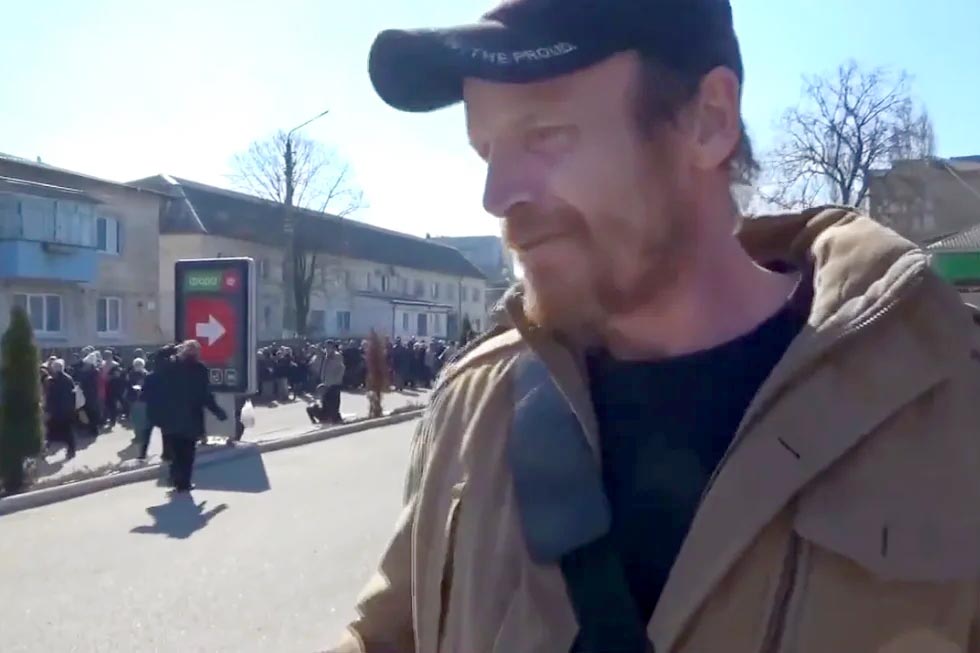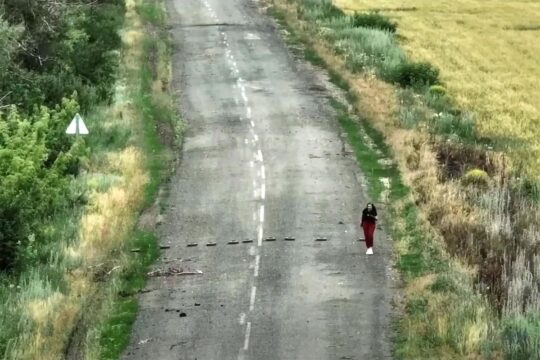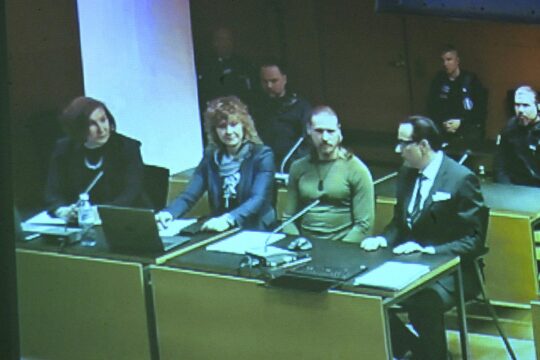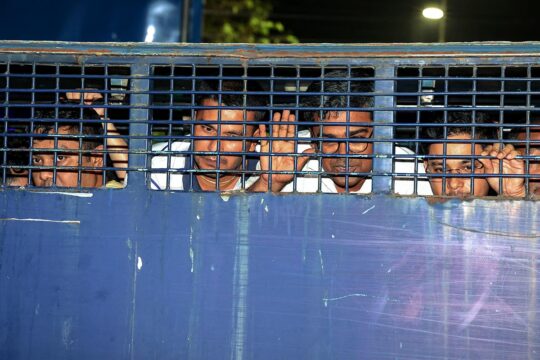When convoys of Russian military vehicles entered the village of Dymer, Kyiv oblast, North of the Ukrainian capital, on February 25, 2022, it was the second day of the full-scale invasion. On March 20, 2022 - information appeared in the media that the Russians appointed their own head of the village, hung a tri-colored flag and organized a celebration with fireworks.
On March 28, RT channel aired a propaganda report on Russian military delivering tons of humanitarian aid to the residents of Dymer. The video was discussed on social media and publicized in the Facebook group “Dymer community - from choices to elections.” The video shows long lines of people receiving humanitarian aid from soldiers with machine guns.
Two days later, in the early morning, the Russians retreated from Dymer. The Ukrainian military and law enforcement entered the village. They started asking people questions and found out the names of those who allegedly collaborated with the occupiers.
Two such men were identified: Oleksandr Kharchenko, born in 1983, aka Sasha the Redhead, who, according to the investigation, was the head of the village, and Oleksandr Melnyk, born in 1977, aka Sasha the Shady, who became the deputy head. They were arrested and tried separately, although witnesses constantly referred to both of them when describing the circumstances of the occupation. Kharchenko’s case was heard by the Solomianskyi District Court, and Melnyk’s by the Vyshhorodskyi District Court of Kyiv oblast.
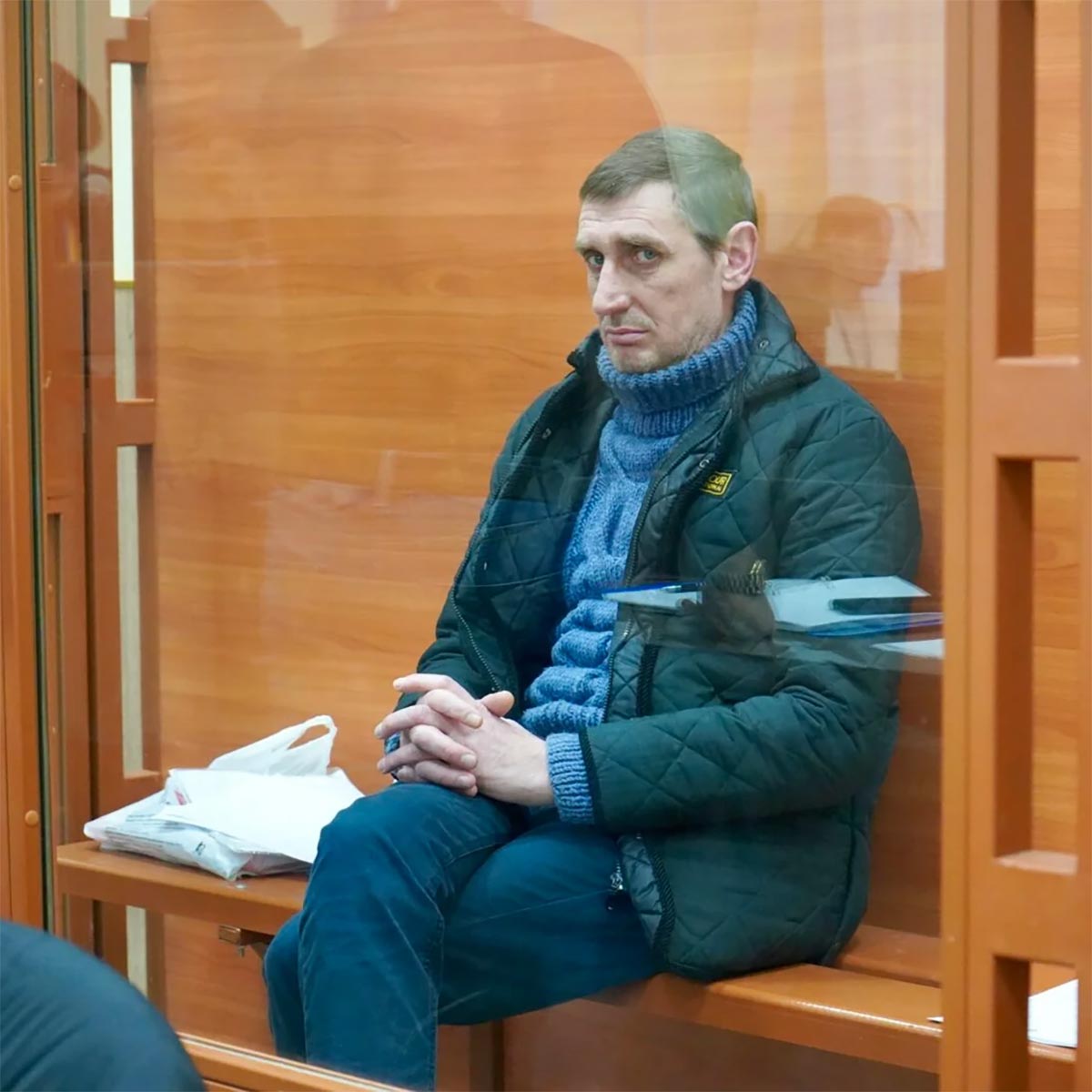
“It didn’t look like he was scared”
Kharchenko had lived in Dymer for a long time with his parents, single, running a small business, delivering logs with his vehicle. A few years prior, he had run for the village council, but failed to get elected and was never again involved in any public or political activity.
According to locals, for the first week and a half of Russian occupation, the head of Dymer, Volodymyr Pidkurgannyi, was delivering humanitarian aid despite heavy shelling. One man told the court that he unloaded a minibus with medications that were sent by Pidkurgannyi. But later, due to threats from the Russians, he would no longer be seen in Dymer.
Then, the office of the Village Council’s head was allegedly taken over by Kharchenko, who said that it was necessary to restore order, that things used to be bad in Dymer. “One of my friends said that Sasha had become the head of the village. We drove there, and they were distributing gasoline. Sasha was sitting in the office in the head’s chair. We had a burst [pipe], and he wrote it down to let the Russians know so they would fix it. He said that there would be Russian money, that a school would be opened,” local resident Svitlana told the court.
Kharchenko explains that people would gather at the village council to find out news and gossip. Russian soldiers would bring a field kitchen there every day and distribute meals and fuel to the locals. According to him, a representative of the Red Cross, also a member of the village council, Maryna Tsapok, and other concerned residents would often come. Those were people who needed to sort something out, such as people whose septic tanks were clogged, or people who needed to organize garbage collection or report someone’s disappearance.
“Who exactly did I give instructions to?! How could I possibly have given any instructions if there were employees of the village council who were in direct contact with Pidkurgannyi? They managed all the facilities. Just because I was distributing humanitarian aid, I somehow got considered the head of the village council,” Kharchenko argued.
It was Kharchenko who was filmed by the Russians in their propaganda video.
- Yes, I commented on what was happening at that moment on the square. No more, no less, he explained at the hearing.
- And what exactly was happening there? the prosecutor asked.
- Russian humanitarian aid was being distributed. A fellow came over with a camera and said: ‘Can you comment?’ So that’s what I did, so to speak.
- Did you enjoy living in occupation alongside the Russian military?
- How can anyone like destruction?
- You didn’t like it?
- Of course not.
- And when you gave this interview, you made this comment: ‘Don’t be afraid, approach the Russian soldiers, ask them for help, we will help everyone’.
- They will help. Do not twist the words! It was said: ‘Do not stay in basements, do not starve. Russian soldiers are not aggressive towards the civilian population, they are giving out humanitarian aid. Come, take it and stop starving’.
Local residents confirm that they saw Kharchenko during the distributions.
- On March 23-24, I saw with my own eyes that he [Kharchenko] was distributing Komsomolskaya Pravda newspapers in that location, one of the eyewitnesses told the court.
- What was Kharchenko’s role? the judge asked.
- He was appointed to replace the head of the village.
- How was he elected?
- I don’t know exactly, but I think it was suggested to him. It didn’t look like he was scared.
The RT video does show Kharchenko standing in the street holding a pile of newspapers. The prosecutor brought to the court a bag containing 60 copies of Krasnaya Zvezda and 90 copies of Komsomolskaya Pravda, as well as Russian rations. After the de-occupation, they were found in the office of the village head, but Kharchenko claims that he did not put them there.
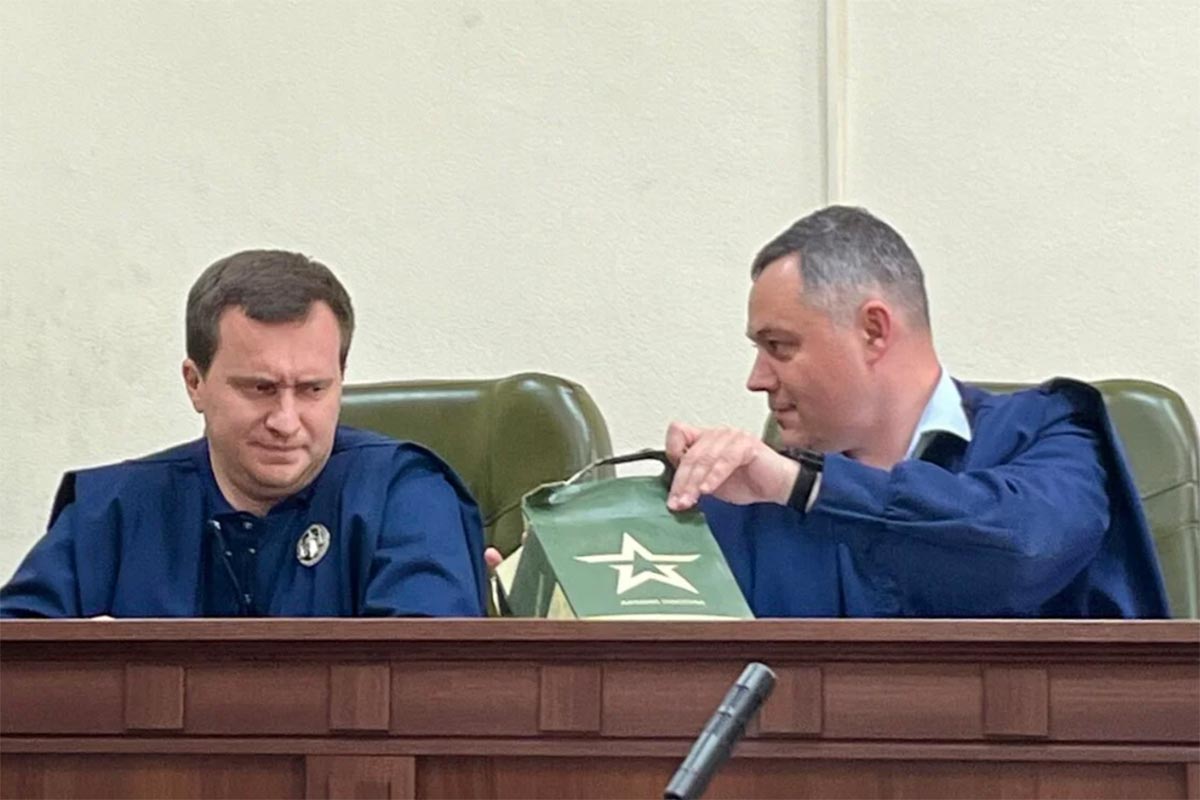
“The real owners of the place didn’t introduce themselves”
It is still uncertain as to how Kharchenko got to the leadership position. The indictment states that on March 16, 2022, a forcible meeting of residents was held to distribute humanitarian aid and Kharchenko introduced himself as the new head of the village representing the occupation authorities. But no direct witnesses to this meeting were brought to the trial.
People claimed that they were aware of everything through rumors: “The Russian military appointed Kharchenko as the head of Dymer. There were talks about it in the village”. Some viewed Kharchenko as a self-proclaimed leader.
Andriy Sologub is the director of the Lytvynivka Lyceum, in the Dymer village. During the occupation, he was the leader of the Vyshhorod Rapid Response Unit of the Ukrainian Red Cross Society. The Ukrainian Red Cross is non-political and helps everyone, regardless of nationality, race, or political preferences. The organization does not cooperate with the military. But the occupiers were constantly pressuring the Red Cross to cooperate, trying to convince the organization to distribute Russian humanitarian aid.
On March 18, Sologub learned that Dymer had a new head and the next day, at the invitation of the occupiers, he came to meet the “new mayor.”
“On March 19, when I entered the office of the Dymer village council, Kharchenko, Melnyk and Klion [a Russian military man] were there. It seemed like Kharchenko was the owner of the office, but in fact, the real owners of the place were entirely different. They did not introduce themselves, they had no insignia. Later we found out that they were members of the 83rd Air Assault Brigade, which is stationed in the city of Ussuriysk. Kharchenko was sitting at a large desk, in the chair of the head of the territorial community. There was a huge map of Dymer in front of him, it was divided into sectors. Melnyk was there, sitting next to him. Melnyk had a notebook and was writing down, as if at a council meeting. Kharchenko said that he was the person responsible for utilities. Melnyk said he was in charge of electricity, asked me where he could find employees of DTEK [Donbas Fuel and Energy Corporation] or RES [regional maintenance service] to fix the power grid”, Sologub testified.
Then came to the court Natalia Tkachenko, the chief accountant of the village council, who was still living in Dymer in March 2022. “At first, I heard from the villagers that a new authority was going to be elected and it would be Oleksandr Kharchenko. I came to pick up my things. When I entered the village council building, he [Kharchenko] was in the head’s office. I asked if I could go to my office. He said yes, so I just went and took my things. Then he came in with his friend, Oleksandr Melnyk... He was repeating: ‘There’s work to be done, there’s work to be done’,” she recounted.
“Melnyk was angry with the authorities”
Melnyk is a native of Cherkasy region. He used to live in Dymer, but at the time of the full-scale invasion, he lived with his wife in a rented house in the village of Lutizh. According to his landlady, he owned a dried fruit store. Kharchenko says Melnyk worked at a construction site and had a team of repairmen.
Lutizh was not taken by the Russians, but Melnyk and his wife deliberately went to the occupied territory. As he later explained in court, they went to pick up his mother-in-law from the village of Ivankiv. However, they never got to his mother-in-law, stopped in Dymer and settled in the premises of the Dymer Utility Plant. They claimed that it was dangerous to travel, and then the road was blocked, so they stayed in Dymer. According to the prosecution, Melnyk became Kharchenko’s deputy head and combined this with the position of manager of the utility plant. Melnyk says that he simply moved into an empty building of the communal utility services with the permission of a friend and started helping people.
In the cold days of March, when people were coming to get humanitarian aid, Tsapok, member of the village council, noticed a stranger wearing gray summer sneakers. It was Melnyk arriving on a bicycle and asking the security guard at the church where he could buy shoes. The next day, she told the court, Melnyk approached her near the Fora store, where the occupiers were distributing food, and said that it was necessary to help people, and then he led the woman to the chief Russian, shook his hand and introduced her.
She then learned that Melnyk had been in business before, but it went bust more than once. “He was very angry with the authorities. And he just wanted to climb a little bit more,” Tsapok recalls. Melnyk partially confirmed this, saying that a missile hit his store in Lutizh.
Melnyk and Kharchenko do not deny that they have known each other for a long time. “I met Kharchenko a long time ago. I’ve probably known him for 10 years. Now I don’t remember what the circumstances were. I was younger, maybe we went to the movies...” Melnyk said in court.
“We had to survive somehow”
The legitimate village head, Pidkurgannyi, did not testify in the court hearings against Kharchenko and Melnyk. Neither prosecutors nor defence lawyers called him as a witness.
In response to the lawyer’s request, the Dymer village council reported that, due to the danger during the occupation, the council was working remotely. Representatives of the local authorities, including the head, were officially located on the premises of the Vyshhorod military administration.
Kharchenko’s lawyer, Viktor Kashpur, repeatedly said that Kharchenko was essentially fulfilling the duties from which the legitimate village head had voluntarily withdrawn.
The defence lawyer referred to the provisions of the Geneva Convention stating that the occupation authorities must, if necessary, provide the inhabitants of the occupied territory with food and medicine. In other words, the Geneva Convention stipulates a certain degree of cooperation between local authorities and the occupiers, which is not considered a crime.
The defendants tried to prove that they did not belong to the occupation authorities but simply made arrangements with the Russians to help local civilians with the Red Cross, although they were not members of the organization. The investigation did not establish the salaries Kharchenko and Melnyk received while performing functions under occupation. There are no official documents signed by the accused in the case files.
Lawyer Pavlo Khaytov believes that Melnyk was engaged in volunteering to the occupied territory, and for doing so, he was rewarded with an indictment and detention. “People might think that he is the deputy head of the Dymer village council or the director of a utility plant. If a person distributes food and the katsaps [pejorative for Russians] don’t shoot him for it, there is only one answer - he is working for them,” Khaytov says.
Melnyk claims that having a Red Cross armband, he was able to bring more than 100 people to the unoccupied territory. But there are no lists or photos to prove it. Furthermore, no one came to court to confirm these claims.
“We had to survive somehow. The fact that we started distributing humanitarian aid alongside Russian soldiers was an offer we could not refuse. They said that if we did not cooperate, they would bomb our houses and create conditions that would make it very difficult to survive. I don’t consider myself guilty,” Kharchenko said in his final words before the judges left for the deliberation room. Melnyk said in his final speech that he believed his stay behind bars was a matter of time and hoped for a change in the law.
The court dismissed the defendants arguments. For the court, the witnesses’ testimonies showed that Kharchenko distributed Russian humanitarian aid on behalf of the invaders. Pidkurgannyi, the legitimate head of the village, also distributed humanitarian aid at the beginning of the occupation, but Kharchenko never helped him. Kharchenko was sentenced to 9 years in prison with confiscation of property, and Melnyk to 7 years, with confiscation.
After the hearing, the lawyer told Melnyk that they would see each other during the appeal. On his side, last summer Kharchenko filed a request to be exchanged and sent to Russia.
This report is part of our coverage of war crimes justice produced in partnership with Ukrainian journalists. A first version of this article was published on the "Sudovyi Reporter" website.


